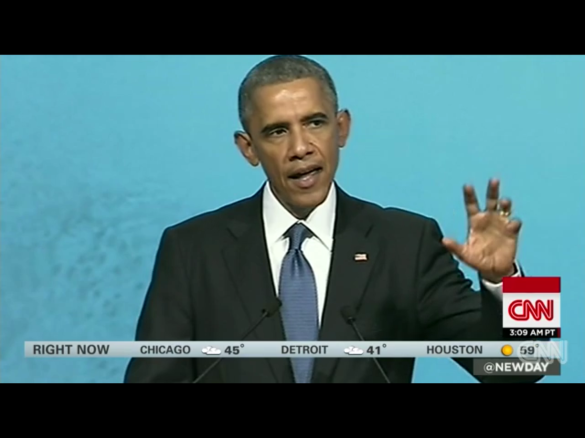Philadelphia – For someone, repeated territorial violations towards member states of the European Union made by the Russian Air Force, and a worrying rearmament of the Russian Army on NATO borders, are enough to move the west to call for a strong reaction to Putin’s warfare in Ukraine and Central Eastern Europe.
However, it was clear that the Presidential Administration of the United States decided not to react with the use of force to Russian military threat to Ukraine and important member states of both the European Union and NATO when Ben Rhodes, the deputy security adviser to the President of the United States, Barack Obama, stated on CNN television that the United States won’t give any military support to Ukraine.
The decision of the Obama Administration came after the republican-led Congress passed a bill to authorize the United States to help support the Ukrainian Army, in order to oppose Russian-backed “separatist” in Eastern Ukraine and equilibrate the balance of military power in the region in so doing.
Despite the Congress voted in favor of giving military help to Ukraine, and several rumors seemed to confirm the willingness of the White House to finally help Ukraine with lethal weapons, the democratic-wing Obama Administration decided not to engage itself in the conflict.
In so doing, President Obama let Ukrainians without an important help that could eventually oppose Russian aggression to the former USSR member and could also reassure important allies to the United States of Central Eastern Europe, such as Lithuania, Latvia, Estonia, Poland, Rumania and Bulgaria.
If seen from the European point of view, the decision of the Obama Administration is difficult to be accepted. However, it is not at all illogical if examined according to the new strategy that President Obama took in foreign policy after the spectacular defeat of the Democratic Party on last November mid-term election.
Obama decided to utilize his executive power to push the United States to have a more assertive role in the Asia/Pacific, a region in which the United States are called to contain the growing power of China both economically and militarily.
The greater attention of President Obama toward the Asia/Pacific is demonstrated by President Obama’s strong support to a quick finalization of the Trans Pacific Partnership, an agreement planed to realize a free-trade area among traditional allies to the United States in the Asia/Pacific, such as Canada, Chile, Japan, South Korea, Australia, New Zealand, Mexico and Singapore, and other important states of the region, such as Peru, Brunei and Vietnam.
Moreover, the Obama Administration proposed to utilize the majority of a $ 534 billion defense budget to strengthen the military presence of the US army in the Asia/Pacific, whereas only $ 789 Million is going to be utilized for the rotating presence of NATO soldiers in Central Eastern Europe.
Obama, who also reactivated diplomatic ties with Cuba in order to strengthen the presence of the United States in the western hemisphere, is so confirming to pay less attention to Europe than other United States Presidential Administrations used to do, as it used to be during the presidencies of George W Bush Senior and Junior, Bill Clinton and Ronald Reagan.
Moreover, there are at least two other reasons why President Obama refused to give military support to Ukraine. The first one is filed with the inconvenience, according to the vision of Obama, to raise military tensions with Russia while the United States are committed to contain other international threats, such as ISIL and China.
A military support to Ukraine will be also inconvenient for Obama because of the internal political situation within the United States, where Obama is seeking support by the most liberal democrats on several issues such as the reduction of greenhouse emissions and the resignation to any military initiative in the world, except the one against ISIL.
Last but not least, the decision of the Obama Administration not to give military support to Ukraine could be also tied to the lack of trust of the United States towards the Ukrainian army, which is still affected by several cases of corruption and mutiny.
The resignation of President Obama to give military support to Ukraine should be balanced by other measures which are necessary to help Ukraine and ensuring the national security of NATO member states of Central Eastern Europe, of which the United States are called to take care facing the inability of the European Union to lead a staunch opposition towards Russia.
First of all, the Presidential Administration of the United States should give economic help to Ukraine in order to allow the Ukrainian Government of PM Arseniy Yatsenyuk to realize important reforms that the President of Ukraine, Petro Poroshenko, promised the international community to be approved as soon as possible.
President Obama should also push for an implementation of economic sanctions toward Russia, in order to led the Russian economy to a definitive collapse after world energy prices dramatically dropped over the last months.
Moreover, Obama, along with the TPP agreement, should push for a quick ratification of the Trans Atlantic Trade and Industrial Partnership -TTIP. This will certainly led the United States and the European Union to a further economic and eventually political integration.
Only together, the United States and the European Union will be able to oppose the raise of China and to successfully answer to threats to global security such as Putin’s Russia and ISIL.
That’s why the TTIP should be considered not only as a mere economical agreement, but also as the adequate stimulus to evolve NATO into a military force committed all around the world to the preservation of the values of the Trans Atlantic Community, Democracy, Liberty, Human Rights and Prosperity.
Matteo Cazzulani
Analyst of Trans Atlantic, Central Eastern European and energy issues
@MatteoCazzulani
